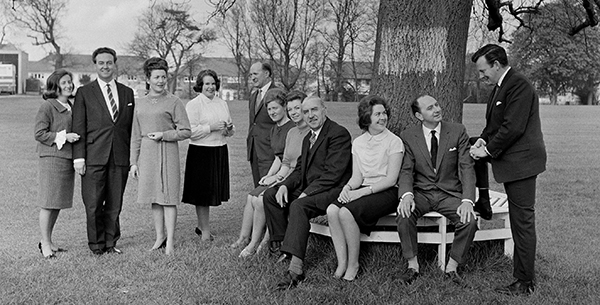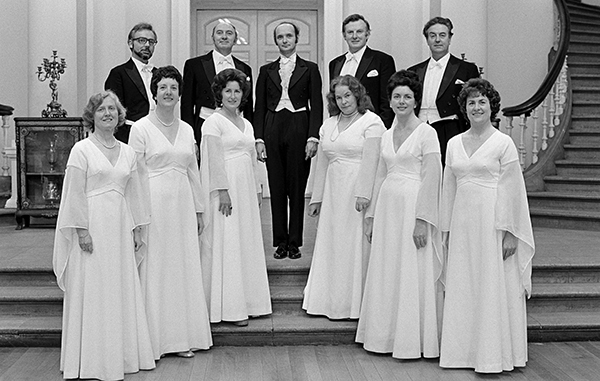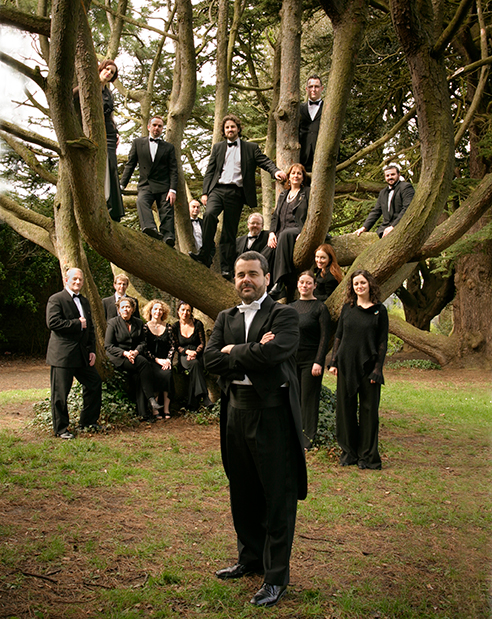MUSIC: Singing for their supper
Published in Features, Issue 1 (January/February 2021), Volume 29A brief history of the evolution of Chamber Choir Ireland.
By Stuart Kinsella
‘Without music, life would be a mistake,’ runs Nietzsche’s pithy aphorism from his 1899 Twilight of the idols. This notion will doubtless also have run through the minds of many a musician during the global Covid-19 pandemic that has silenced churches, concert halls and theatres alike. And yet, amidst the tragedy of so much death, suffering and anxiety, self-isolation has afforded an unusual gift against the continuous background hum of the 21st century. Many have had that rare commodity of time, which has allowed reflection on things achieved and breathing space in which to regroup and ponder future directions. One collective group that has experienced quite the Luftpause throughout Europe is the professional chamber choir. Ireland is fortunate to have had such a group in one form or another for almost 80 years, existing today in its current incarnation as Chamber Choir Ireland. Surprisingly, the choir’s history has not before been told, yet the secret of its survival may very well lie in its early origins.

Above: The Raidió Éireann Singers with their conductor, Hans Waldemar Rosen (seated fourth from right), in RTÉ’s Donnybrook grounds before their European tour in April 1965. (RTÉ Archives)

Above: The RTÉ Singers with their conductor, Proinnsías Ó Duinn (centre), in the Shaw Room of the National Gallery of Ireland in November 1975. (RTÉ Archives)
Origins in church music
Examining the background of choral music in Ireland, it is unsurprising to find that the church was the first great patron of choral music, and Ireland remained in step with the tradition that emerged in western Christendom. In the two medieval Dublin cathedrals, for example, boy trebles were introduced to sing the increasingly complex polyphony that was flowering in the fifteenth century. Choral development throughout Ireland, however, was hampered by both the Reformation and the Tudor reconquest of Ireland, to the extent that by the time the earls flew in 1607 the opportunity for Gaelic aristocratic patronage was much diminished. The Irish harper was not to consort with the worlds of Gabrieli or Gesualdo. European influence instead would flourish in areas of Anglo-Irish control, notably in eighteenth-century Dublin, where passion for the works of Handel nurtured a bloom in choral music and opera. By the nineteenth century singing in choirs had become more democratic and a number of choral societies were established, many of which survive today. Yet professional choir singers could only be found in cathedrals and opera houses before the establishment of Ireland’s own broadcasting corporation and its ensuing musical ensembles.
State broadcasting
State broadcasting began in Europe in the mid-1920s and Ireland’s representative was 2RN, established in 1926. It was later known as Raidió Éireann (RÉ) and, by 1960, Raidió Telefís Éireann (RTÉ), which we know today. Instrumental music was the staple from the start, but several countries also established choirs, such as the BBC Singers (1924), the Rundfunkchor Berlin and the Swedish Radio Choir (both 1925), followed by the Nederlands Kammerkoor and Vlaams [Flemish] Radiokoor (both 1937). It was not until 1942 that a 24-member radio chorus was established in Ireland, which would become Cór Raidió Éireann the following year, just pipping the many post-war radio choirs that were established in Germany—Hamburg, Stuttgart and Munich (1946) and the RIAS Kammerchor (literally broadcasting ‘im amerikanischen Sektor’) in west Berlin (1948)—as well as the Chœur de Radio France (1947).
Cór Raidió Éireann was initially directed by Fachtna Ó hAnnracháin, later music director of Raidió Éireann from 1947 until 1961 and best remembered for expanding the symphony orchestra, establishing a lighter concert orchestra and recruiting a significant proportion of musicians from abroad. Such an extensive portfolio prevented him from continuing to direct the choral group and a new conductor was sought. Hans Waldemar Rosen, who studied music in Leipzig (including composition with Sigfrid Karg-Elert), worked as a music critic for the Leipziger neueste Nachrichten in the 1930s and was conscripted as a war correspondent in 1942. From 1944 he organised many musical ensembles as a prisoner of war in Britain, and by 1948 he had arrived in Dublin, where he taught singing and became chorus master to the Dublin Grand Opera Society. His timing was perfect and he joined Raidió Éireann, directing Cór Raidió Éireann and a series of newly founded choirs: the RÉ Men’s Octet (1949), the mixed voice An Cór Laoidheogach (1950) and the 80-strong RÉ Choral Society (1952). In 1953 he was appointed conductor of the newly established Raidió Éireann Singers, renamed the RTÉ Singers in 1966. Under Rosen the choir developed into a polished ensemble, performing concerts and broadcasts of an expanded repertoire, commissioning and promoting Irish composers, and touring Europe. Guest conductors were also promoted, such as the choir accompanist at the time, Colman Pearce, and later Eric Sweeney.
Rosen retired in 1974, and in his stead was appointed one of the most prominent Irish conductors of his generation, Proinnsías Ó Duinn, who had already been principal conductor of symphony orchestras in Iceland and Ecuador. Ó Duinn’s work with the choir was noted for its quality and inventive programming, and by 1978 he was appointed principal conductor of the RTÉ concert orchestra, a position he would hold until 2003. A former guest conductor, the organist and composer Eric Sweeney (who died in July 2020), succeeded him in 1978, during which time he also held a part-time lectureship at Trinity College, Dublin, and a lectureship in music at the College of Music, the former Municipal School of Music. That year the College of Music became a constituent college of the Dublin Institute of Technology, which itself became part of the new Technological University of Dublin in 2019. Sweeney established an RTÉ Chorus to succeed the RTÉ Choral Society in 1980, but departed for a lectureship at Waterford Institute of Technology in 1981.
His successor was an Englishman, Colin Mawby (who also died recently, in November 2019), a former master of music at Westminster Cathedral (1961–78), already living in Dublin, who had a vast experience of choral music as an organist and prolific composer. In 1984 Mawby instituted the first of several changes at RTÉ, replacing the ten-voice RTÉ Singers with a larger seventeen-voice RTÉ Chamber Choir. The following year he founded the children’s choir, Cór na nÓg, and the RTÉ Philharmonic Choir, all of which he himself conducted. In 1986 Mawby conducted the inaugural concert of the RTÉ Chamber Choir, another landmark in his fertile expansion of choral music at RTÉ, which, in addition to the RTÉ Chorus, then comprised four broadcasting choirs. In 1990, however, a government cap on spending crippled budgets and saw the demise of both the RTÉ Chorus and the RTÉ Chamber Choir, the latter of which was saved by the establishment of an independent National Chamber Choir of Ireland in 1991. The RTÉ Chamber Choir was reinstated briefly in 1994–6, producing the strange situation of the same choir having two names but one conductor. Although it was an initially fraught decoupling, a change in leadership at RTÉ in 1997 saw relations greatly improve, such that the RTÉ Chamber Choir was then subsumed into the National Chamber Choir. Mawby remained at the helm and RTÉ continued to provide partial funding and full access to the music library of the RTÉ Singers.

Above: Conductor Celso Antunes with the National Chamber Choir of Ireland in St Anne’s Park, Dublin, in February 2005. (Alan Roche)
Mawby retired in 2002 and was succeeded by the Brazilian conductor Celso Antunes, who divided his time between Dublin and Cologne. His appointment injected a spark into the choir’s performances which was noted by reviewers, and during his five years in charge the choir toured more ambitiously than ever before, to Poland, Brazil and China, doubtless on the crest of the financial wave at the time. Antunes would go on to conduct the Netherlands Radio Choir (2008–12) but his departure in 2007 was fractious, being caused by that time-honoured tension between principled artistic vision and bureaucratic commercial interests. The financial crash of 2008, together with administrative changes, drastically reduced the number of engagements of the choir, such that a new beginning was most welcome that year with the appointment of a successor, Paul Hillier. An internationally respected choral director, Hillier had co-founded and directed the Hilliard Ensemble and, more recently, directed the Estonian Philharmonic Choir (2001–8) and Ars Nova, Copenhagen (2003–). In 2013 the choir was renamed Chamber Choir Ireland.
Prying patronage from pandemic
Meanwhile, at RTÉ, a heartening development that has emerged from the children’s choir, Cór na nÓg, is the logical development of a more challenging choir for older teenagers called Cór Linn, established in 2018. Along with the prospect of multiple vaccines to this coronavirus, such innovations, as well as the lively amateur choral music scene, give hope for the future of choral music in Ireland. Looking back, Chamber Choir Ireland (and its predecessors) not only is fortunate to have survived the administrative and financial pendulum of history but also, in recent months, has engaged in live-streamed and recorded concerts, prying patronage from pandemic, by returning to its origins, found in Ireland’s first broadcasting choir.
Stuart Kinsella is a tenor in Chamber Choir Ireland and an adjunct research fellow in the School of Music, UCD.
FURTHER READING
M. O’Sullivan Farrell, ‘Hans Waldemar Rosen’, in J. Fischer & G. Holfter (eds), Creative influences: selected Irish-German biographies (Trier, 2009).
R. Pine, Music and broadcasting in Ireland (Dublin, 2005).
L.W. White, ‘Ó hAnnracháin, Fachtna’, in Dictionary of Irish biography (Cambridge, 2016).
















